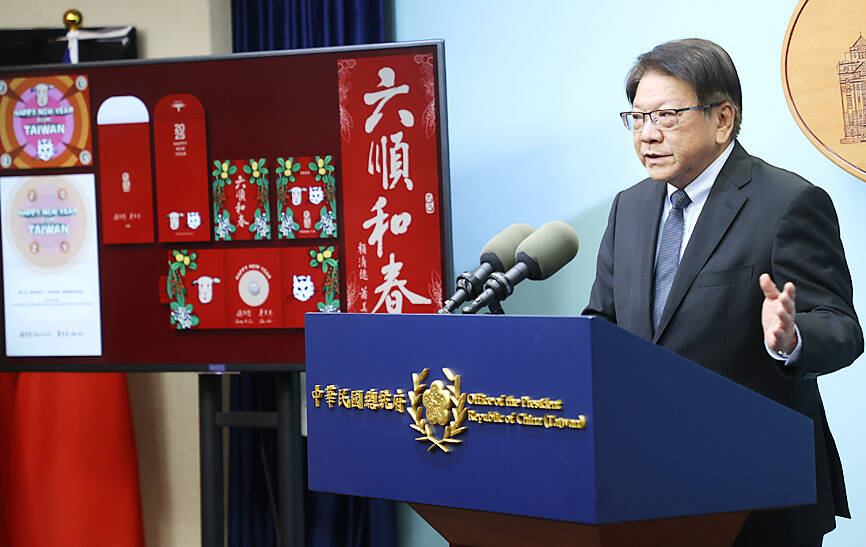The Presidential Office yesterday unveiled its Lunar New Year couplets, red envelopes and lucky bags to welcome the new year.
The designs were created by Akibo Lee (李明道) and features calligraphy by Chen Shi-chan (陳吉山), Presidential Office Secretary-General Pan Men-an (潘孟安) told a news conference, adding that President William Lai (賴清德) and Vice President Hsiao Bi-khim (蕭美琴) also contributed to this year’s design by hand-drawing portraits of a dog and cat to symbolize Taiwan’s warm and friendly attitude, and love for animals.
Three plants native to Taiwan, black ebony, shell ginger and Alexandrian laurel, are also featured on the artwork to give it a more festive appearance, he said.

Photo: CNA
The couplets and envelopes would be available from Wednesday to Jan. 24 at the Presidential Office Building, while the lucky bags would be distributed in person by Lai and Hsiao during the Lunar New Year activities, he added.
Other images and designs also carry meanings, such as the background image of concentric circles and radiating patterns — which symbolize focus, vision, peace and harmony — representing Taiwan’s commitment to democracy and hopes for a brighter future, Chen said.
The couplets and envelopes, inspired by the upcoming Year of the Snake, feature a snake head and a poem by Bai Ling (白聆), conveying a wish for harmony and prosperity, he said.
The phrase “Six harmonies bring spring” sounds the same as “good spring” in Hoklo (also known as Taiwanese), serves as a metaphor for prosperity and celebrates the upcoming holiday, Chen said.

Snow fell in the mountainous areas of northern, central and eastern Taiwan in the early hours of yesterday, as cold air currents moved south. In the northern municipality of Taoyuan, snow started falling at about 6am in Fusing District (復興), district head Su Tso-hsi (蘇佐璽) said. By 10am, Lalashan National Forest Recreation Area, as well as Hualing (華陵), Sanguang (三光) and Gaoyi (高義) boroughs had seen snowfall, Su said. In central Taiwan, Shei-Pa National Park in Miaoli County and Hehuanshan National Forest Recreation Area in Nantou County saw snowfall of 5cm and 6cm respectively, by 10am, staff at the parks said. It began snowing

Global bodies should stop excluding Taiwan for political reasons, President William Lai (賴清德) told Pope Francis in a letter, adding that he agrees war has no winners. The Vatican is one of only 12 countries to retain formal diplomatic ties with Taiwan, and Taipei has watched with concern efforts by Beijing and the Holy See to improve ties. In October, the Vatican and China extended an accord on the appointment of Catholic bishops in China for four years, pointing to a new level of trust between the two parties. Lai, writing to the pope in response to the pontiff’s message on Jan. 1’s

HOLIDAY EXERCISE: National forest recreation areas from north to south offer travelers a wide choice of sights to connect with nature and enjoy its benefits Hiking is a good way to improve one’s health, the Forestry and Nature Conservation Agency said, as it released a list of national forest recreation areas that travelers can visit during the Lunar New Year holiday. Taking a green shower of phytoncides in the woods could boost one’s immunity system and metabolism, agency Director-General Lin Hwa-ching (林華慶) cited a Japanese study as saying. For people visiting northern Taiwan, Lin recommended the Dongyanshan National Forest Recreation Area in Taoyuan’s Fusing District (復興). Once an important plantation in the north, Dongyanshan (東眼山) has a number of historic monuments, he said. The area is broadly covered by

A Vietnamese migrant worker on Thursday won the NT$12 million (US$383,590) jackpot on a scratch-off lottery ticket she bought from a lottery shop in Changhua County’s Puyan Township (埔鹽), Taiwan Lottery Co said yesterday. The lottery winner, who is in her 30s and married, said she would continue to work in Taiwan and send her winnings to her family in Vietnam to improve their life. More Taiwanese and migrant workers have flocked to the lottery shop on Sec 2 of Jhangshuei Road (彰水路) to share in the luck. The shop owner, surnamed Chen (陳), said that his shop has been open for just